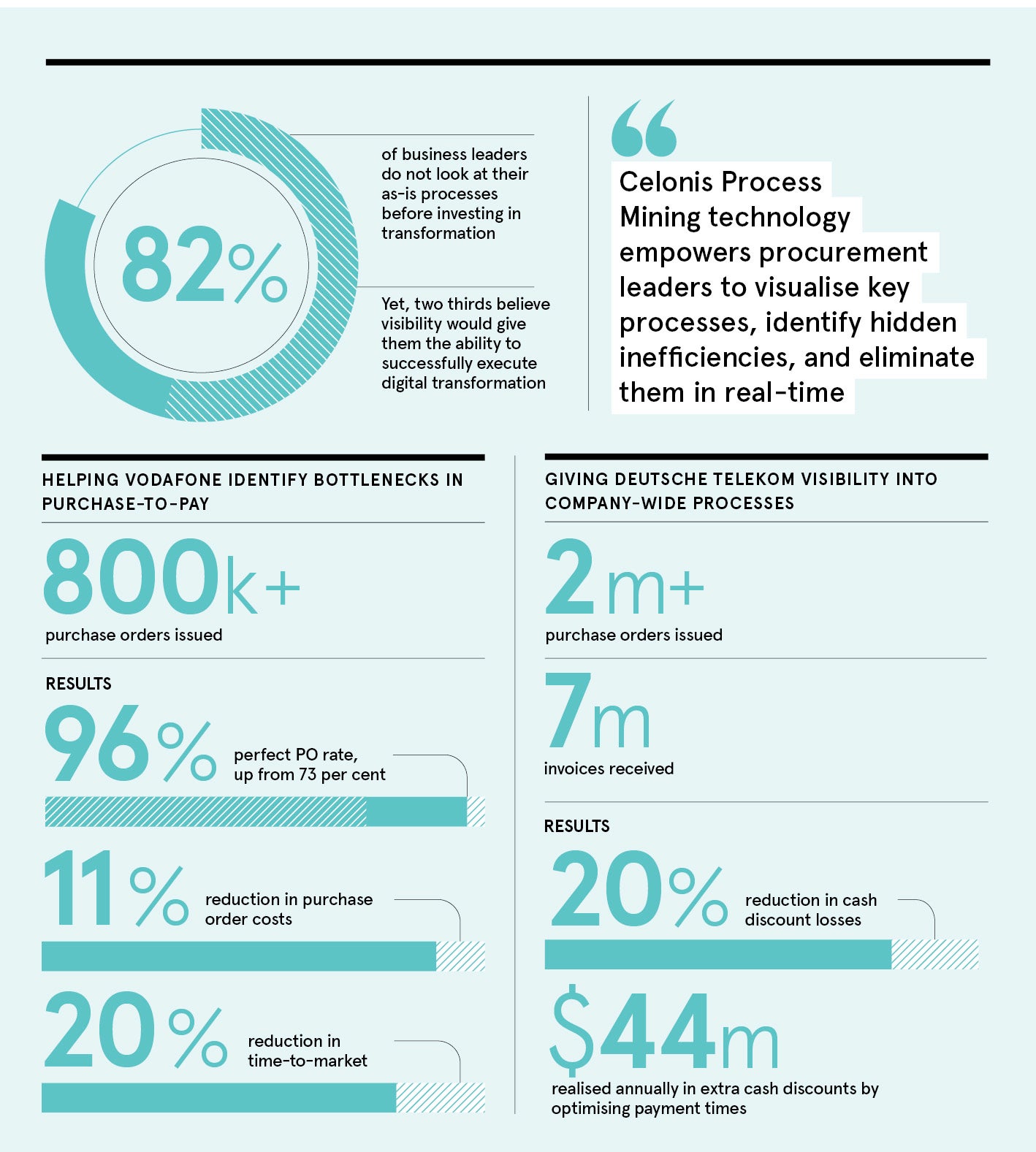For procurement professionals, affordable, efficient and low-risk processes are essential. This applies whether they are selecting products, issuing a purchase order, buying, giving the green light on payments or any other essential task. Without careful management of these processes, business operations can quickly deteriorate.
Despite the need for efficiency, companies rarely begin change with a targeted assessment of their business processes. Instead, managers rush to plug in new software or look for minor changes that may deliver basic improvements. When performance is inevitably impacted, businesses bring in consultants to shape digital transformation, often at great cost and relying on outdated, static information.
Celonis, identified by Gartner as the market-leading process-mining provider, conducted a study to examine process knowledge amid change. It found that 82 per cent of business leaders do not consider processes before embarking on transformation, even though their investment in many such changes is up to half-a-million pounds. Two-thirds said better visibility would give them the confidence they need to execute digital transformation effectively.
As many companies overlook the specific root causes that lie more deeply in the ways they work, total business performance is negatively impacted.
“Leaving procurement process challenges partially or entirely unaddressed doesn’t mean a business can muddle on; it’s much more damaging,” says Andy Joeres, vice president, UK and Ireland, at Celonis, which has more than 700 large customers including Vodafone, GSK and Uber. “Left unattended, these problems actually create a downward spiral for operations and can ultimately threaten sustainability and profitability.”
Typical problems that businesses experience can include ”maverick buying”’ whereby staff place orders with suppliers that are not properly vetted, a costly concern for procurement leaders. When maverick buying is present, expenditure goes unchecked and new suppliers can end up costing the company significantly, further down the line.
What if an organisation could quickly and affordably achieve better outcomes? A more sophisticated approach is to use an automated, objective assessment of current business operations, providing full visibility of key processes at any time, called process mining. This powerful technology enables companies to identify precisely the problems occurring within their processes, remove hidden efficiencies and take corrective action that avoids the problem occurring again in the future.
Procurement often sets the pace for how fluidly an organisation can run; now these departments can obtain the deep insights needed to transform how they work
But for maverick buying and other problems within processes, many firms still tend to be so driven in one area of change that they miss the big picture. “Unfortunately, companies and their procurement units have traditionally been too narrowly focused on how they aim to address process inefficiencies, and those firms would be wise to take the more expansive and ongoing approach that Celonis can offer,” says Joeres.
For a long-term impact, the best-in-class organisations are looking for deeper change, focusing on increased productivity, optimised expenditure and reduced risk. The scale of this change requires smart process-mining technology that can deliver success quickly and the advanced platform from Celonis enables such organisations to derive enhanced transparency of processes across multiple enterprise resource planning (ERP) systems in real time.
The technology not only visualises live processes, it also delivers a full analysis and clarifies how to drive change. It plugs directly into a company’s own large data sources in multiple formats, rapidly constructing a comprehensive picture of how procurement process flows are happening in real time. From there it identifies the most troublesome frictions and presents clear recommendations for actions that address root causes. Those recommendations can easily be automated for repeatability.
UK-based telecoms titan Vodafone is among the many firms making advanced changes to its procurement using Celonis process-mining technology. The enterprise comprises more than 20 operating companies and every year its procurement units issue almost 800,000 purchase orders and receive over five million invoices.
Using process-mining technology, Vodafone has replaced manual data procedures with automation, cutting costs and radically enhancing its ability to track and analyse the effectiveness of its buying practices in real time. Previously, around 15 staff members had to spend nearly a month compiling procurement data, and that information was one month old. Its new technology analyses 20 terabytes of procurement data, presenting live visualisation and process recommendations.
The impact has been enormous: costs per purchase order have fallen more than 10 per cent, while the proportion of perfect purchase orders has soared from 73 per cent to 96 per cent.
Process mining is available to all companies, from the smallest to the largest, explains Divya Krishnan, product marketing manager at Celonis. “We’re seeing a surge of advances in prescriptive and predictive technologies that are now affordable and effective across the enterprise,” she explains.

“Procurement often sets the pace for how fluidly an organisation can run; now these departments can obtain the deep insights needed to transform how they work.”
Process mining becomes increasingly important as companies of all sizes expand, gaining more operations and procedures which need to be managed, protected and improved upon.
Many weaknesses are hard enough for businesses to spot without advanced technology and they become more and more obscured as companies acquire other firms or take on additional staff and customers.
“Businesses often add multiple manual processes, or legacy workarounds, as a result of acquisitions or even organic expansion. They can end up with duplicate master data in numerous source systems, poor system integration and departmental silos,” says Krishnan. “Process mining helps solve the data challenge quickly by harnessing all the information, analysing it and enabling proactive improvements.”
To find out more about how your procurement department can increase productivity, optimise working capital and reduce risk please visit celonis.com

